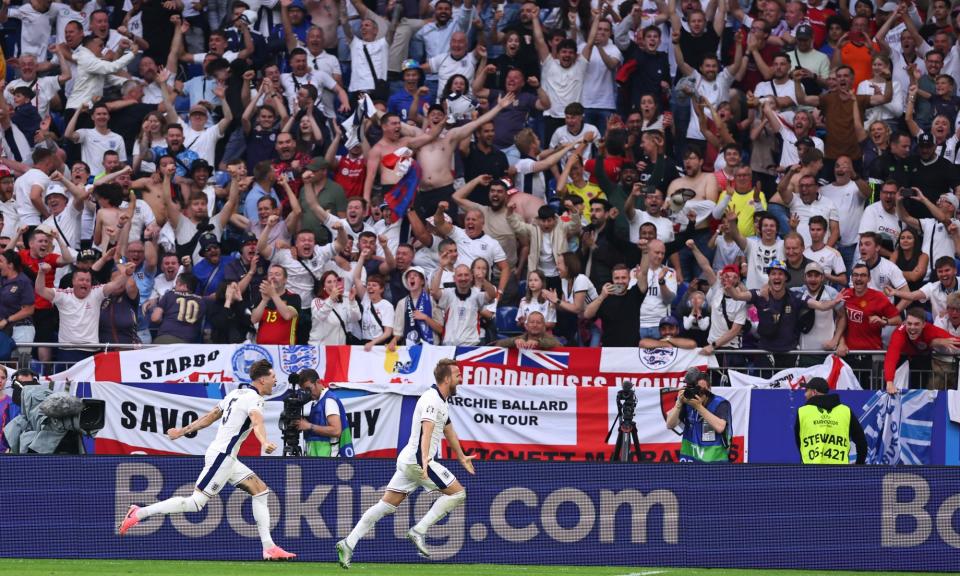Jeers turn to cheers as happy England fans call truce with Gareth Southgate

These are the moments you wait for as a supporter. Yes, it was a 2-1 victory scraped together against a Slovakia team who had run out of steam half an hour earlier. Yes the 94 minutes prior were riddled with moments that went from frustrating to infuriating. But to come out and win and to win like that; suddenly – and for a short moment – anything feels possible.
The turnaround inside the Arena AufSchalke is challenging to describe. The sheer shift in scale was astronomical. There had been whistles and jeers and a sense of a bubbling up, at 1-0 down and with seconds to go. The sense that this could be Iceland on steroids, vituperation in excelsis, was building. But then, instead, a roar; a roar that was surprise as much as relief and delight.
Related: England 2-1 Slovakia: player ratings from the Euro 2024 last-16 match
The final whistle of normal time, when it came seconds after Jude Bellingham’s surely-to-become-iconic overhead kick, prompted perhaps the loudest rendition of “Please don’t take me home” since the Welsh made it their anthem in 2016. When the second went in from Harry Kane and the Lennon and McCartney of this team had fully aped each other’s celebrations, there were white shirts twirling in the air as if this was the Bernabéu. A round of the Great Escape soon followed and, for once, it felt appropriate.
When England had finally eked out victory, all eyes turned to the manager. Gareth Southgate had completed a walk into the three lions’ den five days previously, choosing to applaud the fans in Cologne when all many of them wanted was to tell him where to go. He was pelted with cups and fingers of gesticulation. In Gelsenkirchen he did the same again, but here the details were different. He made less of a deal of it, for a start, and more of the fact of hugging each of his players in front of them. When he turned to the stands this time, his players were still milling around him, and when he raised his hands and clapped, the crowd responded in kind.
Southgate has spoken of the “unique situation” he finds himself in with regards to England’s support, who are perhaps tired of him, frustrated with elements of his play and bewildered at why a group with so many big names is not functioning like a team. But he has also commended their behaviour in games to this point, particularly during the Slovenia fixture where the atmosphere was also so poisonous. And for the duration of this match that duality endured, ultimately to England’s benefit.
So when, before kick-off, Southgate’s name was read out over the public address system, it was booed. Then followed the lustiest rendition of the national anthem of the tournament to date.
When play got under way, there was calm, and England were given time to play into the game. Every positive moment was greeted with a refrain of “Ing-er-land”. Even the opening goal for Slovakia was not widely jeered, perhaps simply out of shock. But once passes started being misplaced again, the volume went up.
As the half finished on something of an England flourish there was a wall of supportive noise followed by, at the sound of the referee’s whistle, a pervasive booing which could not be described as anything other than huge. Fortunately we didn’t get to hear what would have happened had the score been the same at full time.
England fans will now say a grateful farewell to Gelsenkirchen, which is not the easiest place to get to, nor the most comfortable place to hang around in. The mood in the city was quiet, almost sedate in the buildup, a striking difference from the drunken festivities of Cologne and Frankfurt. Clearly the previous experience of the city had left a mark, when England’s opening fixture against Serbia was blighted by transport failings before and after the match.
Logistics were much improved this time, fortunately, after lengthy but cordial discussions between the Football Association, the Football Supporters’ Association and local authorities. There were, oh happy day, shuttle buses laid on for supporters, and trams (not necessarily large trams) running every two minutes to the ground from three hours before kick-off. Such was the scarring from a fortnight ago, however, that many England fans wanted to start their moves more than three hours before, causing a bit of a blockage in the mid-afternoon, with FSA representatives finding themselves acting as impromptu stewards.
While crowds generally moved onwards without problems, the situation for those with disabilities remained dispiriting. One wheelchair user, Anthony from Hertfordshire, had found himself without any information as to how to deal with the crowds.
“We were told to take the tram but the lift going into and out of the platforms is out of order,” he said. “And I’ve now had to wheel myself through a very smelly tunnel.” Anthony was eventually able to find a taxi to complete his journey to the ground. A penny for his thoughts now.

